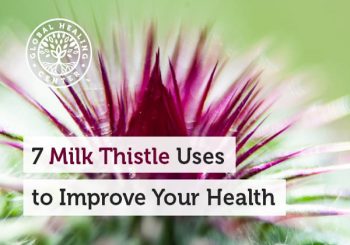Guest Writer for Wake Up World
Milk thistle (Silybum marianum), a member of the Asteraceae family, is a therapeutic herb with a 2000-year history of use in traditional Chinese, European, and Ayurvedic medicine. Originally native to Southern Europe, Asia Minor, and the Mediterranean region, the plant now grows wild throughout the world. In addition to being one of the most commonly used supplements for supporting liver health, milk thistle also offers specialized nutrition for the cardiovascular system, prostate, and gallbladder. High-quality, organic milk thistle is inexpensive, readily available, and should be on your list.
[pro_ad_display_adzone id=”110028″]
How Milk Thistle Improves Your Health
Let’s take a look at seven exciting ways milk thistle supports good health.
1. Assists Antioxidant Activity
The health benefits of milk thistle lie in its seeds, the extract of which is called silymarin. Silymarin is a potent antioxidant. The extract contains natural compounds called flavonolignans, which are phytochemicals that are part flavonoid and part lignan. Silibinin is the most active flavonolignan in silymarin. While silibinin itself is a strong antioxidant, silymarin is 8 to 10 times more potent than silibinin alone in scavenging free radicals.[1]
2. Nutritional Support for the Liver and Gallbladder
Milk thistle’s foremost role in traditional medicine is to support liver and gallbladder health. The liver is one of your body’s primary organs for detoxification. Maintaining its proper function is critically important to overall wellness. Milk thistle is one of the best herbs you can use to promote liver health. Silymarin helps the liver grow new cells by boosting protein synthesis.[1] Silymarin may even counteract some toxin-induced liver ailments.[2]
3. Encourages Normal Lipid Profiles
Milk thistle may support normal lipid profiles. Early research suggests that silymarin, combined with other flavonoids, may promote ideal lipid absorption and synthesis in the body. The exact mechanism behind these properties is unknown, although it may relate to the herb’s strong antioxidant properties.[1]
4. Promotes Healthy Skin
Topical preparations of milk thistle extract may benefit the skin. Silymarin appears to encourage normal skin cell development.[3] A topically-applied, silymarin-based skin cream also promoted healthy skin.[4] Some have even begun to look at silymarin as a natural replacement for conventional sunscreen.[5]
5. Supports Normal Blood Sugar
Recent studies have focused on milk thistle’s potential to encourage normal blood sugar. Daily administration of silymarin may promote normal blood sugar levels. Silibinin specifically has shown beneficial effects on conditions that arise from imbalanced blood sugar.[6]
6. Supports Prostate Health
The prostate is a small organ in the male reproductive system. It produces prostatic fluid, which nourishes and protects sperm. Unfortunately, the prostate can also be the point of development for threatening conditions. Fortunately, milk thistle supports normal prostate health. Silymarin has shown many benefits to prostate health, including normal cell development and the development of new blood vessels.[7] A related milk thistle compound, isosilybin B, was found to be particularly effective.[8] More research is necessary, but studies like these provide strong support for the use of silibinin to support prostate health.
7. May Counteract Mushroom Poisoning
Amanita phalloides, more commonly known as the death cap, is a deadly mushroom commonly mistaken for edible varieties. The appropriately-named fungus is one of the most poisonous mushrooms on Earth and the most frequent cause of fatal mushroom poisonings worldwide. Milk thistle not only can prevent this but intravenous administration of silymarin is, in fact, the only thing that works. Silymarin stabilizes cell membranes and inhibits the absorption of the toxin.[9] In any case of poisoning, such administration should be done by a medical provider.
The Side Effects of Milk Thistle
Milk thistle is safe for most people, but those with a ragweed allergy should avoid it. As a member of the ragweed family, the plant can upset the condition.[10] Due to its effects on blood sugar, those who already suffer from low blood sugar should exercise caution. While safe for humans, milk thistle is toxic to cows and sheep when eaten in large amounts over a period of days or weeks.
Best Tips for Growing Milk Thistle
You can buy organic milk thistle seeds online, but if you want them fresh, you may have to grow your own. Fortunately, the plant is extremely easy to grow. Maybe even a little too easy. There’s a reason it’s often thought of as a highly invasive weed.
In fact, be sure to check your local laws before planting. Because of its prolific nature, some jurisdictions restrict milk thistle. For example, the state of Washington recognizes the plant as a “Class A Noxious Weed” that must be eradicated when found. You could face a stiff fine for growing it intentionally.
Once you’ve checked your local laws, you’ll need to obtain viable milk thistle seeds. These can be ordered online or harvested from an existing plant. You can start the seeds indoors, but the plant is hardy enough that you can probably plant directly outside.
In mid to late summer the flowers will dry and transform into a white puff that’s similar to a dandelion. This is when it’s time to harvest your seeds. Beneficial aspects aside, remember that the plant is still a thistle. It has little, spiky barbs, so wear thick gardening gloves and be careful. Remove all the puffy white flower heads and put them in a paper bag. Keep the flowers in the bag for about a week to dry. At the end of the week, shake the bag vigorously to separate the seed from the fluff.
Easy Milk Thistle Tea Recipe
Making a tea is a great way to access the health benefits of milk thistle seed. Using a mortar, grind one tablespoon of milk thistle seeds into a powder. Steep in 3 cups of boiling water for about 15 minutes and strain. Enjoy a cup 30 minutes before meals or bedtime. Some cultures even enjoy roasted, crushed milk thistle seeds as an alternative to coffee.
References:
- Surai PF. Silymarin as a natural antioxidant: an overview of the current evidence and perspectives. Antioxidants (Basel). 2015 Mar; 4(1):204-247.
- Abenavoli, L, et al. Milk thistle in liver diseases: past, present, future. Phytother Resh. 22 Oct;24(10):1423-1432.
- Singh RP, Agarwal R. Flavonoid Antioxidant silymarin and skin cancer.Antioxid Redox Signal. 2002 Aug;4(4):655-663.
- Becker-Schiebe, M, et al. Topical use of a silymarin-based preparation to prevent radiodermatitis : results of a prospective study in breast cancer patients. Strahlenther Onkol. 2011 Aug;187(8):485-491.
- Katiyar SK. Silymarin and skin cancer prevention: anti-inflammatory, antioxidant and immunomodulatory effects (Review). Int J Oncol. 2005 Jan;26(1):169-176.
- Kazazis CE, et al. The therapeutic potential of milk thistle in diabetes. Rev Diabet Stud. 2014 Summer;11(2):167-174
- Ting H, et al. Molecular mechanisms of silibinin-mediated cancer chemoprevention with major emphasis on prostate cancer. AAPS J. 2013 Jul;15(3):707-716.
- Davis-Searles, PR, et al. Milk thistle and prostate cancer: differential effects of pure flavonolignans from Silybum marianum on antiproliferative end points in human prostate carcinoma cells. Cancer Res. 2005 May 15;65(10):4448-4457.
- Wellington K, Jarvis B. Silymarin: a review of its clinical properties in the management of hepatic disorders. BioDrugs. 2001;15(7):465-489.
- Milk Thistle. National Center for Complementary and Integrative Health, National Institutes of Health. Updated Sept 2016. Accessed 14 Feb 2020.
Originally published at Global Healing Center and reproduced here with permission.
Recommended articles by Dr. Edward Group:
- What are Whole Foods and Why are They Important for Health?
- Top Vitamin C Benefits for the Skin
- Wim Hof Breathing: 6 Benefits for Body and Mind
- Camu Camu: The Next Great Superfood
- Emotional Freedom Technique (EFT): 5 Benefits and How To Do It
- Enokitake Mushrooms: 7 Benefits of this Superfood
- Here are 7 Reasons to Try a Cleanse
- 3 Scientifically Proven Ways Meditation Boosts Your Immune System
- What is Candida? Understanding Yeast Imbalance
- Acerola Cherry: 8 Benefits of this High-C Tropical Super Fruit
About the author:
Dr. Edward F. Group III (DC, ND, DACBN, DCBCN, DABFM) founded Global Healing Center in 1998 with the goal of providing the highest quality natural health information and products. He is world-renowned for his research on the root cause of disease. Under his leadership, Global Healing Center earned recognition as one of the largest natural and organic health resources in the world. Dr. Group is a veteran of the United States Army and has attended both Harvard and MIT business schools. He is a best-selling author and a frequent guest on radio and television programs, documentary films, and in major publications.
Dr. Group centers his philosophy around the understanding that the root cause of disease stems from the accumulation of toxins in the body and is exacerbated by daily exposure to a toxic living environment. He believes it is his personal mission to teach and promote philosophies that produce good health, a clean environment, and positive thinking. This, he believes, can restore happiness and love to the world.
For more, please visit Global Healing Center.
[pro_ad_display_adzone id=”110027″]








